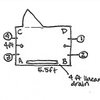Need recommendation for a Whole House Filter
Edw05
18 years ago
Related Stories

GARDENING AND LANDSCAPINGPatio Details: Sliding Fabric Panels Filter the Light Just Right
Stepping up to the harsh sun and heat of the desert Southwest, this intimate patio is an exotic escape right outside
Full Story
HEALTHY HOMEHow to Choose a Home Water Filtering System
Learn which water purification method is best for your house, from pitchers to whole-house setups
Full Story
PRODUCT PICKSGuest Picks: A Whole Lotta Wonderful Window Coverings
Blinds, drapes, shades and curtain rods to give your windows a polished, put-together look
Full Story
PATTERN12 Great Decorative Alternatives to Curtains
Filter light and views while drawing the eye by dressing windows in specialty glass, artistic screens or snazzy shades
Full Story
HOUZZ TOURSHouzz Tour: Whole-House Remodeling Suits a Historic Colonial
Extensive renovations, including additions, update a 1918 Georgia home for modern life while respecting its history
Full Story
REMODELING GUIDES10 Tips to Maximize Your Whole-House Remodel
Cover all the bases now to ensure many years of satisfaction with your full renovation, second-story addition or bump-out
Full Story
COLORPick-a-Paint Help: How to Create a Whole-House Color Palette
Don't be daunted. With these strategies, building a cohesive palette for your entire home is less difficult than it seems
Full Story
DECLUTTERING5 Ways to Jump-Start a Whole-House Decluttering Effort
If the piles of paperwork and jampacked closets have you feeling like a deer in the headlights, take a deep breath and a baby step
Full Story
HOUSEKEEPING12 Steps to a Safe, Cozy Home for a New Year
From smoke detectors to furnace filters, let January 1 be a reminder of some must-dos around the house
Full Story
PATIO OF THE WEEKPlaytime for the Whole Family
With a climbing wall, a fire pit and low-maintenance lushness, this remodeled California patio has something for everyone
Full Story






MacQ
Gary_PA
Related Discussions
Do I need a whole house water filter? If so, what kind?
Q
Question about whole-house water softeners/filters (servicing)
Q
Whole House Water Filter System
Q
Whole house water filter no shut off valve after filter
Q
MacQ
speedbump
Gary_PA
MacQ
Gary_PA
Edw05Original Author
speedbump
Gary_PA
MacQ
MacQ
Gary_PA
MacQ
Gary_PA
MacQ
Gary_PA
MacQ
MacQ
MacQ
Gary_PA
gelfey
andy_c
myoneandonly